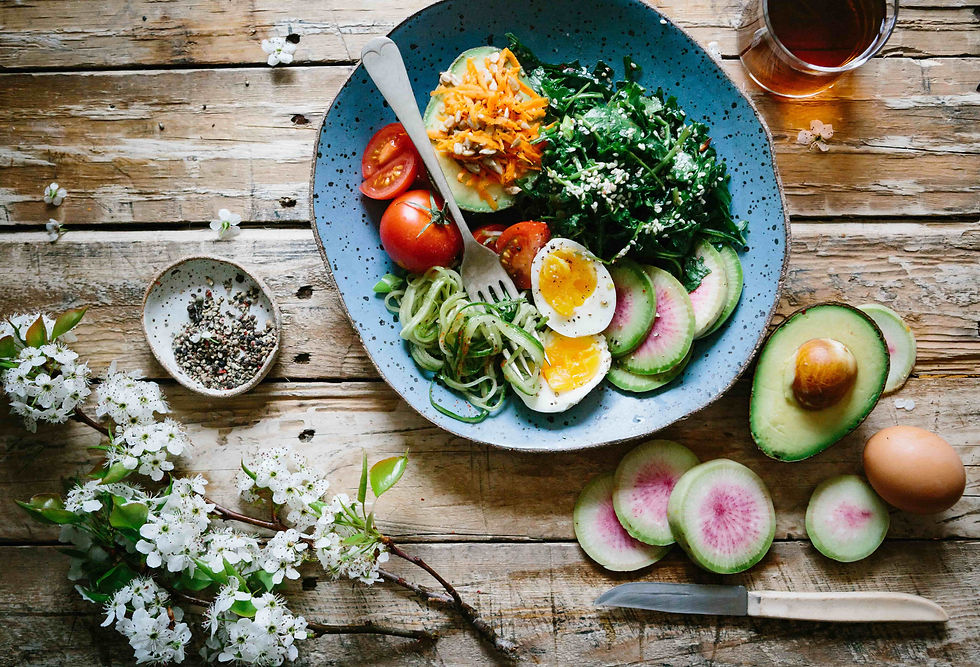What are the best and worst fruits for blood sugar?
- Katrin Peo
- Nov 8, 2022
- 4 min read
Updated: Sep 17
The title of this article might sound a little black-and-white — “best” versus “worst” fruits — but in reality, things are not that simple. The purpose here is not to glorify some fruits while demonising others, but to look at what the science actually says about fruit and blood sugar.
Whole fruits provide fibre, vitamins, minerals, and antioxidants that support overall health. But some fruits affect blood sugar differently depending on their glycemic index (GI), glycemic load (GL), ripeness, processing and portion size. By understanding these factors, you can make smart choices and enjoy fruit as part of a balanced, blood-sugar-friendly diet.
If you haven't read yet my article about the importance of blood sugar balance, you can find it here.

Why Fruits Are Not Off-Limits for Blood Sugar
Many people with diabetes or blood sugar concerns worry about fruit, but most whole fruits can absolutely fit into a healthy diet.
Fiber slows sugar absorption: Whole fruit contains natural fiber that helps prevent sharp blood sugar spikes.
Nutrients matter: Fruits are packed with vitamins, minerals, and antioxidants that protect your health long term.
Form makes a difference: Fresh, frozen, or lightly cooked fruit is better than juice or dried fruit, which have concentrated sugars and less fibre.
It is recommended to consume 2-3 servings of fruits or berries per day. The approximate size of a serving is:
40g dates
50g banana
100g cherries, plums or peaches, etc.
110g kiwi, pomegranate, fresh fig, papaya, grapes
120g apples or pears
120g berries (strawberries, raspberries, blueberries, blackberries, lingonberries, cranberries, wild strawberries, black currants, red currants, sea buckthorn berries)
130g orange, tangerine, grapefruit, pomelo
300g lemon or lime
Bottom line: fruit is not the enemy — it’s about choosing wisely and watching portions.
Glycemic Index vs. Glycemic Load in Fruits
Understanding GI and GL can help you see why some “worst fruits” lists are misleading.
Glycemic index (GI): Measures how quickly 50 g of carbs from a food raise blood sugar compared to pure glucose (GI = 100).
Glycemic load (GL): Adjusts for how many carbs are in a typical serving.
For example, watermelon has a high GI, meaning its sugars are absorbed quickly. But a standard serving (2 slices) doesn’t contain many carbs, so the GL is low. This means your blood sugar might not spike as much as the GI number alone suggests.
You can read more about the glycemic index here and learn the glycemic index of different foods here.
🍓 Best Fruits for Blood Sugar (Lower GI / GL Options)
These fruits are rich in fibre and tend to have a gentler effect on blood sugar:
Berries – strawberries, blueberries, raspberries, blackberries
Apples and pears (with skin)
Citrus fruits – oranges, grapefruits, mandarins
Cherries, peaches, plums, apricots
Kiwi
These fruits are versatile, refreshing, and great for snacks, breakfasts, or adding natural sweetness to meals.
🍌 Fruits to Enjoy in Moderation (Higher GI or Sugar Content)
No fruit needs to be completely avoided, but some may raise blood sugar more quickly if eaten in large amounts:
Bananas (especially very ripe ones (yellow with brown spots on them)
Grapes
Pineapple and mango
Watermelon (high GI, but modest GL if eaten in small portions)
Dried fruits (much higher in sugar. As the water has been removed from the dried fruit, it does not fill you up like a whole fruit would and you can easily overeat the dried fruits and get too much extra sugar. For example, dried apricots contain around 43g of sugar per 100g (5 dried apricots), while fresh apricots contain 7g of sugar per 100g.
Fruit juices (higher in sugar concentration, minimal fibre. For example a glass of freshly squeezed orange juice contains around 20g of sugar.
There is also difference in people, how their blood sugar reacts to the same fruit. Depending on your sleep quality, your stress levels, your gut microbiome, your physical activity, you may respond differently to sugar in fruit than your friend would.
👉 Smart tip: Pair these fruits with protein or healthy fat (e.g., apple with nut butter, banana with Greek yogurt) to balance their effect on blood sugar.
Practical Tips for Eating Fruit Without Spiking Blood Sugar
Choose whole or frozen fruit over juices, just fruit smoothies or dried forms.
Watch your portion sizes — a handful of grapes is better than a bowl.
Combine fruit with protein, fibre, or healthy fat to slow sugar absorption.
Pay attention to your body’s response — everyone’s blood sugar reacts differently.
If you want to know how your body's blood sugar reacts to different foods, drinks, stress, you can try wearing a continuous glucose monitor (CGM- Continuous Glucose Monitor) for a few months. There are various companies in the market that offer this product/service, such as Veri, Levels, Nutrisense. It helps you get to know your body better and know what better choices to make for your body in terms of food, drink and lifestyle.
Final Takeaway
Labeling fruits as “best” or “worst” oversimplifies the science. Most whole fruits are healthy and can be part of a balanced diet, even if you’re watching your blood sugar. What matters most is:
Portion size,
Whether the fruit is whole or processed, and
How you combine it with the rest of your meal.
Enjoy fruit for its flavour, fibre, and nutrients — just keep an eye on balance and moderation.
If you are someone looking to achieve better health, struggling with weight issues, looking to incorporate healthy habits into your daily routine, don't hesitate to reach out to me for nutrition counselling and health coaching at info@katrinpeo.com.






Comments